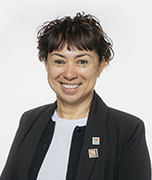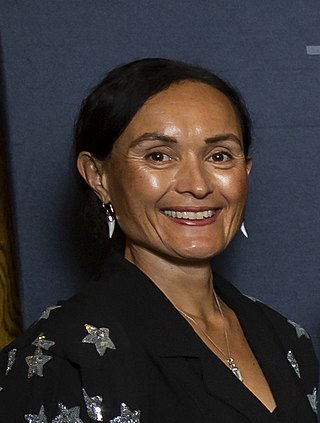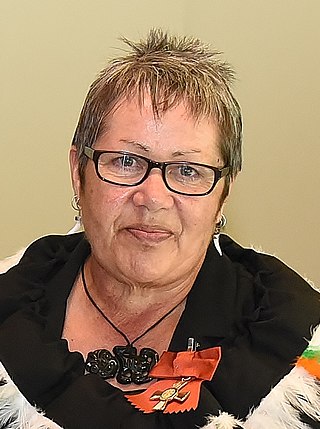
Valmaine Toki is a New Zealand barrister and solicitor, and professor of law at the University of Waikato, New Zealand.

Valmaine Toki is a New Zealand barrister and solicitor, and professor of law at the University of Waikato, New Zealand.
Professor Toki is a Māori woman, of Ngati Rehua, Ngati Wai, Ngāpuhi and Ngati Whatua descentiwi. [1] In 2011, Professor Toki was the first New Zealander and first Måori appointed by the President of the UN Economic and Social Council as an independent expert on the United Nations Permanent Forum on Indigenous Issues where she served two terms of three years. Her recent appointment, in 2022, by the president of the UN Human Rights Council to the UN Expert Mechanism on the Rights of Indigenous Issues, as the first Måori and first New Zealander builds on this role.
She studied law at the University of Auckland, followed by a master's degree as an He Ture Pumau Scholar in business administration at the University of Tasmania, Australia. [2] Her master's focused on marine resource management. [2] She also completed her LLM at the University of Auckland.
As part of Professor Toki's doctoral research into the disproportionate offending rates of Māori people in the New Zealand criminal justice system, she travelled to Asia and North America to study community court systems. She completed her PhD in 2016. [3]
Professor Toki worked for Te Ohu Kai Moana Trustee Ltd on Māori fisheries, aquaculture, and asset allocation. In 2007 she was appointed to a lecturer position at the University of Auckland and taught in the areas of contemporary Treaty of Waitangi and Māori issues, jurisprudence and legal method. [2] In 2012 Professor Toki commenced her role at Te Piringa, Faculty of Law, University of Waikato where she remains today.
Her book Indigenous courts, self-determination and criminal justice advocates for the establishment of a marae-based Indigenous court in New Zealand. [4]
Iwi are the largest social units in New Zealand Māori society. In Māori, iwi roughly means 'people' or 'nation', and is often translated as "tribe", or "a confederation of tribes". The word is both singular and plural in the Māori language, and is typically pluralised as such in English.

The University of Waikato, is a public research university in Hamilton, New Zealand established in 1964. An additional campus is located in Tauranga. The university performs research in the disciplines of education, social sciences, and management and is an innovator in environmental science, marine and freshwater ecology, engineering and computer science. It offers degrees in health, engineering, computer science, management, Māori and Indigenous Studies, the arts, psychology, social sciences and education.

Moana Jackson was a New Zealand lawyer specialising in constitutional law, the Treaty of Waitangi and international indigenous issues. He was an advocate and activist for Māori rights, arguing that the New Zealand criminal justice system was discriminatory and leading work on constitutional reforms. In 1987 he co-founded Ngā Kaiwhakamarama i Ngā Ture. He also supported the rights of indigenous people internationally – for example, through leading the working group that drafted the United Nations Declaration on the Rights of Indigenous Peoples and sitting as a judge on the International Tribunal of Indigenous Rights in the 1990s.
Ngāti Rārua are a Māori tribe of the Tainui tribal confederation.
Margaret Shirley Mutu is a Ngāti Kahu leader, author and academic from Karikari, New Zealand and works at the University of Auckland, New Zealand. She is Māori and her iwi (tribes) are Ngāti Kahu, Te Rarawa and Ngāti Whātua.
Diggeress Rangituatahi Te Kanawa was a New Zealand Māori tohunga raranga of Ngāti Maniapoto and Ngāti Kinohaku descent. At the time of her death she was regarded as New Zealand's most renowned weaver.

Linda Tuhiwai Te Rina Smith, previously a professor of indigenous education at the University of Waikato in Hamilton, New Zealand, is now Distinguished Professor at Te Whare Wānanga o Awanuiārangi. Smith's academic contribution is about decolonising knowledge and systems. The Royal Society Te Apārangi describes Smith’s influence on education as creating "intellectual spaces for students and researchers to embrace their identities and transcend dominant narratives".

The judiciary of New Zealand is responsible for the system of courts that interprets and applies the laws of New Zealand. It has four primary functions: to provide a mechanism for dispute resolution; to deliver authoritative rulings on the meaning and application of legislation; to develop case law; and to uphold the rule of law, personal liberty and human rights. The judiciary is supported in its work by an executive department, the Ministry of Justice.
Leonie Eileen Pihama is a New Zealand kaupapa Māori academic.
Elizabeth Mary Rata is a New Zealand academic who is a sociologist of education and a professor in the School of Critical Studies in Education at the University of Auckland. Her views and research on Māori education and the place of indigenous knowledge in the New Zealand education system have received criticism from other academics, as per the academic process.
Tania M. Ka'ai, sometimes known as Tania Kaai-Oldman, is a New Zealand education academic. She is a full professor of language revitalisation at the Auckland University of Technology.

Hinemoa Elder is a New Zealand youth forensic psychiatrist and former television presenter. She is a professor in indigenous research at Te Whare Wānanga o Awanuiārangi, a fellow of the Royal Australian and New Zealand College of Psychiatrists, and sits on the Māori Advisory Committee of the Centre for Brain Research.
Matire Louise Ngarongoa Harwood is a New Zealand clinical researcher and trainee general practitioner. She is an associate professor at the University of Auckland. Harwood was the 2017 New Zealand L'Oréal UNESCO For Women in Science Fellow. Her expertise is in Māori health, focussed on reducing health inequity by improving indigenous health and well-being.

Tahu Hera Kukutai is a New Zealand sociology academic; she is Māori, of Ngāti Tīpā, Ngāti Mahanga, Ngāti Kinohaku, Ngāti Ngawaero and Te Aupōuri descent, and as of 2019 is a full professor at the University of Waikato. In 2022 Kukutai was elected a Fellow of the Royal Society Te Apārangi.

Mere Anne Berryman is a New Zealand kaupapa Māori academic. She is Māori, of Ngāi Tūhoe, Ngāti Awa, and Ngāti Whare descent and as of 2019 is a full professor at the University of Waikato.
Brendan J. Hokowhitu is a New Zealand academic who is of Māori, Ngāti Pūkenga descent and as of 2019 is a full professor at the University of Waikato.
Dominic O'Sullivan is a New Zealand-Irish-Australian political scientist and Honorary Fellow of the Royal Society of New Zealand. As of 2020, he works at Charles Sturt University.
Claire Winfield Ngamihi Charters is a New Zealand Māori academic from the Ngāti Whakaue, Tūwharetoa, Ngāpuhi and Tainui tribes. She specialises in indigenous peoples’ rights in international and constitutional law. She is an associate professor in the Faculty of Law at the University of Auckland and co-director of the Aotearoa New Zealand Centre for Indigenous Peoples and the Law.

Melinda Webber is a New Zealand academic, and is a full professor at the University of Auckland, specialising in Māori identity and ways in which race, ethnicity, identity and culture impact on young people and their success. She is of Ngāti Hau, Ngāti Kahu, Ngāpuhi and Ngāti Whakaue descent.
Kura Paul-Burke is a New Zealand Māori marine scientist, and is the first woman Māori professor of marine science at the University of Waikato. Her research focuses on mātauranga Māori and aquaculture.